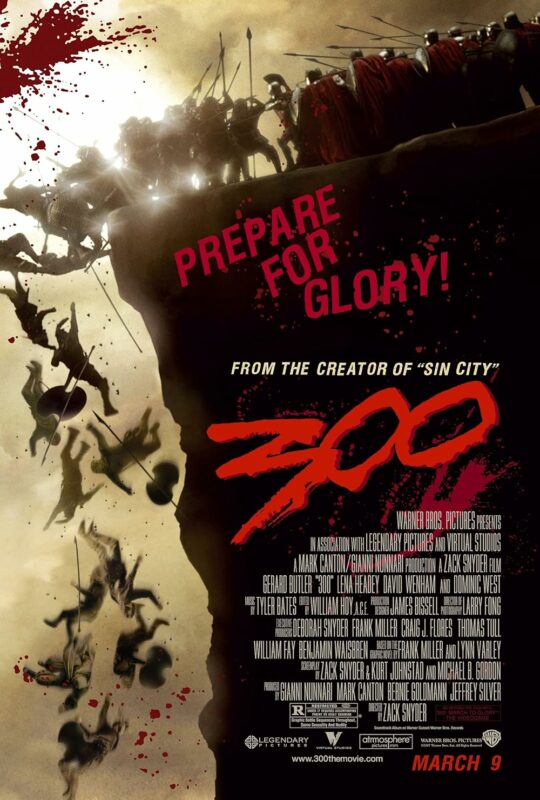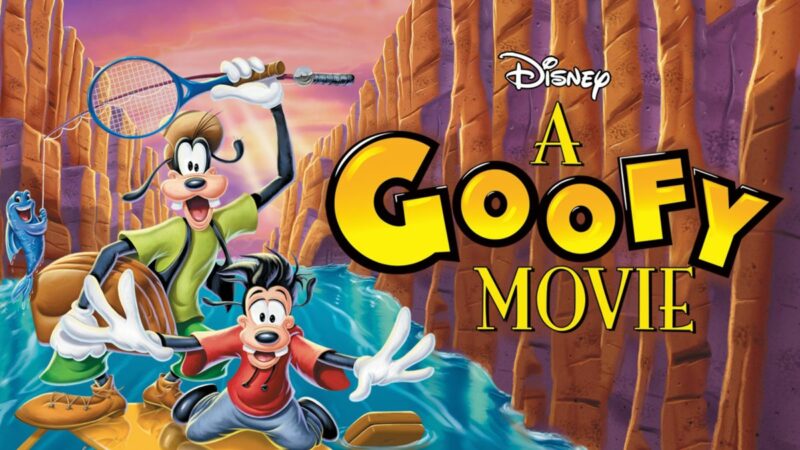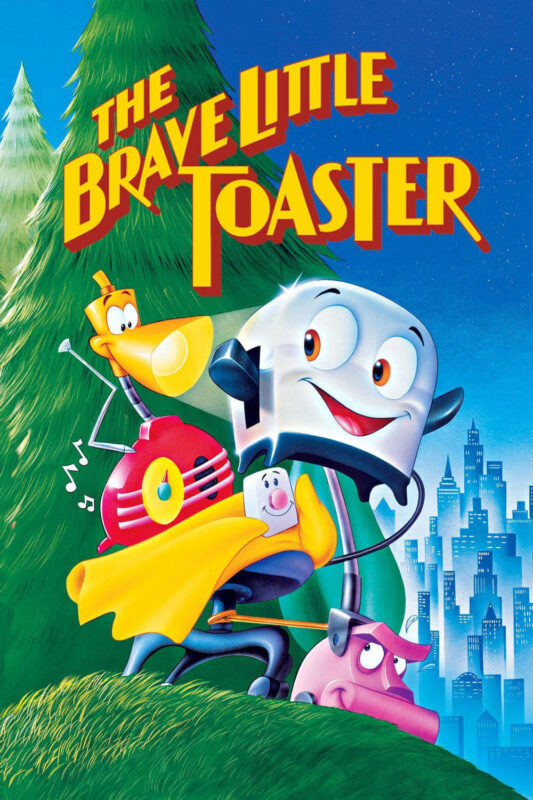
This movie’s soul has two wolves inside it. One is called Larry, the other is called Karl. Larry has bedroom eyes and a body built for sin; Karl is packing 8.5 inches of lupine cock (uncut) and goes “yyyip-yip owo :3” when mounted. I’m not writing these words. You’re imagining them. Stop flushing your Haldol, fool. Don’t you want to get better?
Let’s start the review again. The Brave Little Toaster is the chimerical fusion of two incompatible ideas:
Idea 1: make a bland, inoffensive kid film. A plucky band of household appliances (a toaster, vacuum cleaner, radio, desk lamp, and electric blanket) lose their owner and journey to the big city to find him. Along the way, they have thrilling (but not TOO thrilling!!) adventures, learn a valuable lesson about friendship or teamwork or some shit, and things end happily: with licensed toys and merchandise flying off the shelves and key executives cashing in their stock options. Ka-ching!
Idea 2: make a borderline horror film that explores Blade Runnerish themes of age, change, obsolescence, and mortality, while commenting on rampant consumerism at the height of the Reagan era.
I doubt I’m kicking a hornet nest by calling Idea #2 the more interesting of the two. But the thing about The Brave Little Toaster is its abrupt tonal shifts, the grinding edges, and the way its moods clash. Or rather, don’t clash. The incongruity works, the dark and light sides reinforce each other, the kiddie stuff allows the serious moments to punch harder and cut deeper. A consistently dark movie like Watership Down can be adjusted to, but here, the movie repeatedly tricks you into lowering your guard, just so it can shank you in the proverbial prison shower.
It has some surprisingly intense scenes (a demonic clown, a bog that sucks the characters to certain doom, a Mengelian mad scientist dungeon…), and they burst out of nowhere, like cop cars when you’re doing 83 in an 80 zone. In one scene, cute household appliances clean a house while grooving to “Tutti Frutti”. In the next, a Phil Hartman-voiced air-conditioning unit commits suicide (“IT’S MY FUUNCTIOONNN!!!”) because he can’t stand being stuck in a wall all day. The constant whiplash is viciously effective.
The Brave Little Toaster received limited release in 1987. It earned jack dollars and shit cents at the box office but left a mark inside the animation trade itself. Many of its artists would later work at Disney, Pixar, and Warner Brothers, and its fingerprints are evident in Beauty and the Beast‘s singing crockery, The Little Mermaid‘s off-Broadway musical stylings, and even in something like Henry Selick’s Coraline. It’s Brian Eno’s “10,000 people bought the album and all of them started a band the next day” apothegm in action. For Toy Story fans, this movie is the Dead Sea Scrolls (“Wow, so that’s where John Lasseter got the idea for Sid’s room!”)
Adapted from a children’s story, it’s also a prosecution brief against 80s culture. Or, more particularly, the yuppified “high eighties”, when trade liberalization and Reagonomics led to an explosion of strip malls selling foreign-made consumer goods to Middle America. This pumped the gas on a culture of disposability: once you repaired things when they broke, now you threw them out. The Brave Little Toaster pointedly contrasts good ol’ fashioned American appliances (like the toaster) with weird, swanky hi-tech electronics (who are nasty and hostile toward the main characters); symbolic of how America has lost its way. This is a cartoon Donald Trump would appreciate (assuming he didn’t fast-forward to see if there’s any fight scenes or nudity, which he probably would.)
(Side note: the “Worthless” cars getting smashed at the junkyard are nearly all American. We see Fords, Corvettes, Cadillacs, and Lincolns, plus a British Aston Martin and a German Porsche, but there are no Toyotas, Hondas, or Nissans. About 25% of cars on American roads in 1987 were manufactured by Asian companies, and I don’t think this omission was meaningless or accidental.)
This anti-materialism theme goes down a dark road. The toaster and his friends arrive in the city, still seeking their owner (who they call “Master”, like cultists. You hear the capital M in their voices). The city is eerily empty. There’s a corporate logo on every building and not a human in sight.
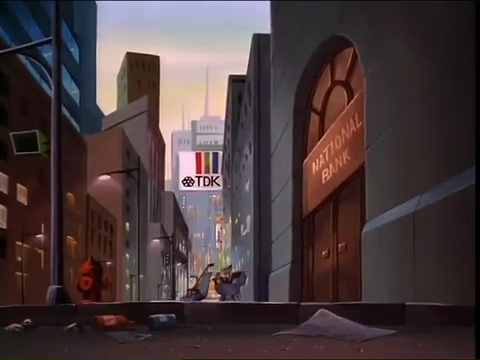
They find the Master’s apartment and make a terrible discovery: they’ve been replaced by new and better versions of themselves. The Master never lost them, he didn’t want them. Who needs a transistor radio when you have a computer? How can a dinky little toaster compete with an electric oven? It’s a wrenching moment that bares the film’s thematic heart: the appliances were loyal to their owner…but he felt no loyalty in return. To them, he’s Master. To him, they’re garbage.
A typical Letterboxd user would write something like “hurr hurr, this film promotes hoarding, also the radio is a GAY ICON #slay #werk” while scratching the surgical threads the doctor stitched above their prefrontal cortex. But I don’t think that’s true, or the point. The movie’s not saying you should hang onto junk or never throw things out. It’s about something tragically universal: devoting your life to someone or something…only to get tossed in the trash once you’re no longer needed. Forget the toaster: this same story could be told about a dog and its master; or a woman and her husband; or a worker and his job; or a soldier and his nation; or a believer and his god. Sometimes what looks like loyalty is actually just exploitation.
I watched Blade Runner and was struck by the sense that you could flip Roy Batty from villain to hero with about one or two script edits. His behavior is perfectly reasonable. Betrayed and denied the possibility of life, wouldn’t you do what he does? Hunt down the ones responsible? See how high the body pile gets before they gun you down? This is kiddie Blade Runner, told from Batty’s POV.
Then comes the legendary “Worthless” scene, which is not scary, just hopeless and nihilistic, driving a knife into the audience’s heart as deep as a knife will go. Toaster and friends are put in the trash, and then hauled to a junkyard where towering slag-like heaps of scrap rise through the filthy air, like the spoor of an titan that eats and shits metal. They watch helplessly while cars get crushed into tiny cubes under a bruise-black sky, while a gigantic crane magnet ominously hovers overhead, ready to catch runners. The junkyard has the air of a Nazi extermination camp, or maybe hell. The worst part? This is where they think they belong. Imagine deserving to be at Auschwitz.
“Worthless” feels almost gratuitously cruel, but it’s masterfully written and directed. The cars (which receive only a few seconds of screentime each) are deftly characterized, and respond to their plight in unique ways. One begs; another is in denial that she’s junk (“I just can’t seem to get started!” she says, as her wheels fall off); some are scared; most are just resigned. They tell little sad stories about their pasts (one raced in the Indianapolis 500, another took a man to a graveyard) that we never hear the ending to, because the crusher pounds them into dust. Who cares about their stories? They’re just trash.
Each rewatch reveals a new (and painful) detail that I didn’t see before. Like how one car (a Chevrolet 3100) uses a last spurt of ignition to drive forward on the conveyor belt, into the crusher’s teeth. He can’t escape, so he chooses death on his own terms. This is ugly but brilliant filmmaking: no scene in any Disney movie (not Bambi, not Fantasia, not The Black Cauldron) is as fearless.
I don’t want to make The Brave Little Toaster sound like Come and See. The sad crapsack stuff is only a fraction of the whole. It stands out because the rest of the film is so light.
Yes, obviously the toaster escapes the junkyard. And obviously the Master’s apparent betrayal gets rugpulled. And obviously some characters who we thought were dead come back to life. Things end happily, because they must. But children don’t trust happy endings, do they? I never saw this as a kid but can imagine my reaction. “Worthless” is the real ending. The phony happy stuff is non-canon boilerplate, tacked on against the director’s will. Although I wouldn’t have used those exact words, it’s what I would have felt. Kids believe in hell for a long time after they’ve stopped believing in heaven.
A fair amount of The Brave Little Toaster is aimed about two feet over the head of the average preschooler. The radio keeps up a steady barrage of dated references (“north by northwest! Watch out for low-flying airplanes!”), and they even slip in an adult joke or two. I’m guessing an animator (at some point in the process) sharpened his pencil and said “fuck it, this is gonna bomb. I’ll put titties in this children’s film and let Jesus take the wheel.” Think Don Bluth was gangsta for putting bird cleavage into his films? This movie has tape deck cleavage. Your move, Don.

At one point, a TV announcer thoughtlessly grabs some papers from a cabinet. It’s porn.
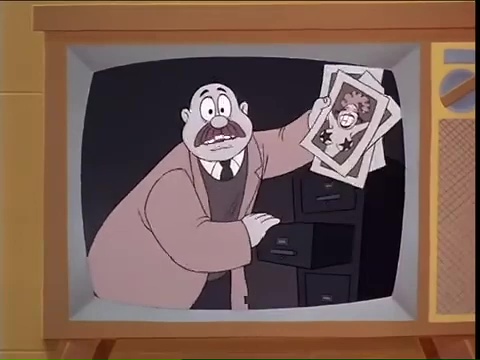
The lighter scenes generally have a dark and jagged crack running through them. You notice it, or you don’t. Near the movie’s midpoint there’s an inane sequence where frogs and a fish and a bird fight over a worm. It’s a decent bit of Disney-inspired nonsense (with synchronized frogs swan-diving into a pond), but shining through is the fact that they’re trying to kill a worm. Nature remains red in tooth and claw. Again, the childlike presentation elevates the (surprisingly mature) themes like a springboard.
Van Dyke Parks contributes four original songs. I don’t know if they’re great songs in the Alan Menken sense, but they’re weird and special. I haven’t heard music like this in any animated movie before.
“City of Lights” is the uplifting “we’re off to see the wizard” tune, but it’s written and sung with a eerie flat affect. A tone of insincerity bleeds through, like they already know the journey will end at a junkyard. “B-Movie” is a hilariously morbid disco tune, full of cod-Gothic flourishes. “Worthless” is an incongrously upbeat pop-country number, with a sour piano ostinato swilling in the mix like curdled milk (a guy on UltimateGuitar says it’s Em7, but I’m away from a piano and can’t confirm this). “Cutting Edge” is a deliberately revolting mashup of Oingo Boingo, Devo, and Gary Numan, where the hi-tech devices strut their stuff (although they certainly aren’t cutting edge anymore. Even their visual look is tacky and ugly and “80s kitsch”, as opposed to the understated, timeless designs of the main cast). It’s brilliantly (in)appropriate songwriting that elevates the film.
I’ve said many good things about The Brave Little Toaster. I like the tone, music, subject matter, directing, and some of the writing.
What don’t I like? Sadly, literally everything I haven’t mentioned: characterization, acting, storytelling, and animation.
Animation: it looks like a cheap TV show. The drawings are clean and bright but have no depth or contour: characters are illustrated with a single tone and a shadow. The opening shot is an ugly UPA-style painting that looks nothing like the rest of the film. The film basically didn’t have a budget, and this is visible on every frame. One of life’s tragedies is that animation lives or dies on money. It doesn’t matter how well-written or directed or acted a movie is: you need a team of skilled artists cranking out high-quality footage, or the results will simply be unwatchable. This didn’t have the resources it needed. You’re watching an interesting idea slowly starve to nothing on the screen.
A tiny budget is compounded by bad decisions. How do you make a household appliance emotive and sympathetic? The dubious solution the character designers arrived at was “slap a human face on everything”. Even the junkyard magnet gets a SCARY FROWNY FACE, just in case you didn’t realize he’s bad. Fuck off.
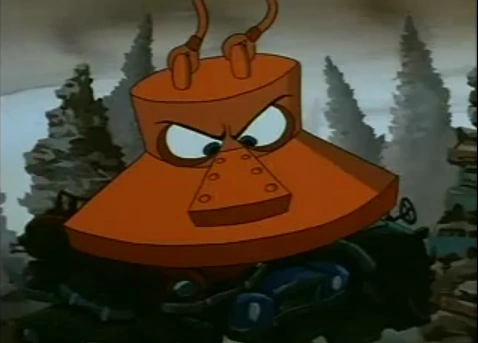
Characters: terrible. The film barely has any. The vacuum cleaner and radio possess a single personality trait apiece (a grump, and an unbearable chatterbox). The toaster, blanket, lamp, and human have no personalities. They are blanks.
Toy Story lacks Toaster’s audacity and emotional weight, but as far as character development goes, it tattoos a swastika on its chest and curb-stomps this film’s face into the pavement. Woody and Buzz and Sid are obviously great, but even minor characters like Rex and Hamm are carefully-written, with personalities and inner lives. You can visualize Mr Potato Head in a arbitrary situation (maybe he’s in a boat, and it’s sprung a leak!), and imagine exactly what he’d say and do (he’d get flustered and cranky, would complain a lot, would try to plug the leak with a detached body part and fail humorously, etc). What would the toaster do in that same situation? I don’t know. Be generically spunky and heroic? There’s just nothing there.
Acting: SNL actors and Z-list randos offer an artisanal blend of dated comedy impressions and annoying noises. The blanket’s voice is as insufferable as warm rhinoceros piss dribbled down the back of my neck. Where’s Judith Barsi when you need her? (My immediate thought was “dead” and I felt like an asshole. Then I checked Wikipedia: her dad killed her in ’88. I still feel like an asshole.)
The dialog jags on the ear, like bad improv. At 3:10 the desk lamp says “can’t even hear your voice around here with all the racket around here!” Was he supposed to say “around here” twice? At 26:10 the vacuum says “who’s idea was it to come this way anyway?” Was he supposed to say “way” two times in four syllables? Phil Hartman is the film’s best actor, but the writers murder him fifteen minutes in (a typical rookie mistake).
Writing: hit or miss. I have little time or love for Joss Whedon, but scriptwriting is another area where Toy Story is superior. Here’s a quote from John Kricfalusi (sadly, it’s not “I plead guilty”, spoken in the Superior Court of California).
Most Disney movies are derived from 4 or 5 page fairy tale stories, and then filled up with 65 more pages worth of junk that has nothing to do with the stories: naked flying babies, animals that wipe dishes clean with their butts, long sneezing sequences, big chunks of insufferable pathos and more.
That’s a good description of The Brave Little Toaster, too. Stuff constantly happens, but it’s tangential fluff that doesn’t connect with the plot or deepen our understanding of the characters. It’s just there.
The endless bickering among the main cast is pointless, wastes time, and never goes anywhere interesting. A subplot involving a car battery (which the devices must periodically plug into to recharge themselves) is dropped from the film: they lose the battery but continue on without apparent difficulties, apparently now powered by Satan. The sequence at the parts store is padded with useless shots of the guy eating marshmallows and making smoothies.
And while I don’t deserve a medal for noticing logic holes in the The Brave Little Toaster universe, it truly doesn’t make sense. Why is there nobody in the city? Well, so that the appliances can hop around freely without attracting a crowd (or an exorcist). But what’s the in-universe explanation? There isn’t one. It’s just pure writer’s convenience.
The film adheres to the Toy Story rule: appliances can move around, but must freeze when humans are present. But the junkyard magnet is obviously autonomous and doesn’t obey the rule (it reveals its sentience to Rob while trying to crush him to death for no reason). Maybe there’s a psychopathic human crane operator somewhere that we don’t see. But doesn’t Rob have questions about why he almost died? Does he complain to the owner of the junkyard? Who owns the junkyard, anyway, and is he aware that it’s being run by a demonically possessed crane?
The script is studded with “placeholder jokes”—tossed-off gags that a writer doubtless intended to replace with a funnier one but failed to ever actually do so. Some trigger a near-decapitatory amount of head-scratching. The radio pleads with the toaster: “You gotta hide me! I’ll do anything! Bread? I can get you bread! Mountains of hot cross buns!” Why hot cross buns? Out of all bread-related products, why mention one that can’t fit inside a toaster? The TV announcer says “A bargain in every buck! A buck in every pocket! A pocket in every trouser!” What does he mean? What’s a “trouser”? The radio says “We’re trapped here like rats! Small little rats with no hair and one leg!” Are rats noted for being easily trapped? That’s not my experience with them. And if the rats are small, isn’t calling them “little“ redundant, or are there small huge rats? And “no hair” suggests he’s subverting the metaphor by making it literal, which is a common thing for jokes to do (“He was as tall as a 6′3″ tree”)…but then the “one leg” detail makes no sense. Desk Lamp has one leg, but everyone else has four legs (Toaster, Radio), wheels (Vacuum), or is a blanket (Blanket).
At final analysis, they’re appliances, or tools to be used. Despite the cute faces, utility is what defines them. They don’t walk on their legs even when they have them: they awkwardly hop around, because humans designed them to be sturdy and structurally rigid, not flexible. Everything they do is awkwardly expressed through a mask of man’s design. That’s the weird thing about “toy movies”—how can a thing have life when it’s so clearly designed to be dead? Like Sartre said: “A grocer who dreams is offensive to the buyer, because such a grocer is not wholly a grocer.”
I think I’ll remember The Brave Little Toaster, although not always for good reasons. It has an interesting ragged quality to it, like metal that hasn’t been buffed smooth. Some parts pierce the surface of the mind, others remain out of tantalizingly out of reach. Maybe it’d be best if I didn’t overthink it. It’s a film for children. Nothing more. It encodes a noxious pro-hoarding message and the radio is a gay icon and it has two wolves fighting inside it.

